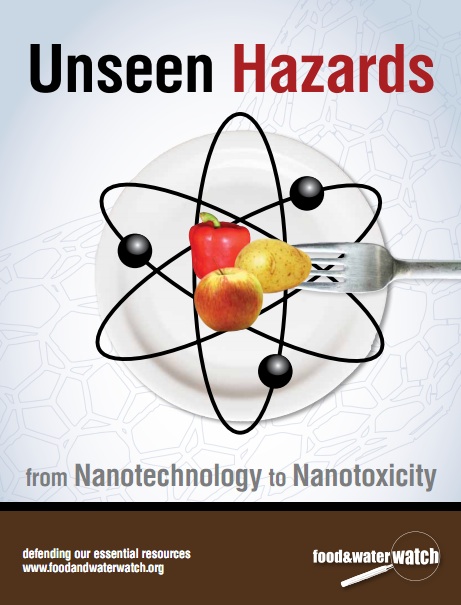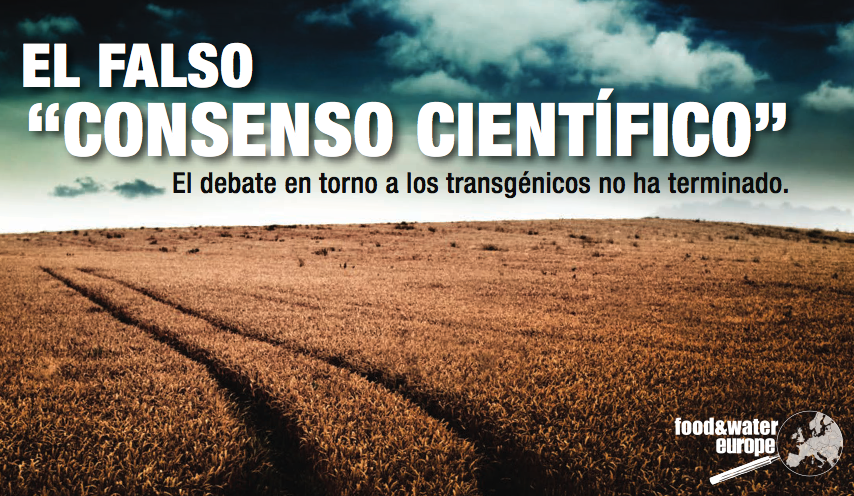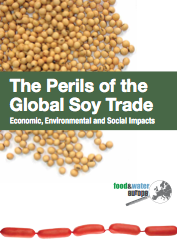Las empresas de biotecnología agraria, junto a sus partidarios del mundo académico y la blogosfera, están usando todos sus recursos para difundirel mito de que existe “consenso científico” en torno a la seguridad de los cultivos y alimentos trangénicos. Afirman que con los datos disponsibles, el debate está terminado. Esta campaña de relaciones públicas, con la ayuda de grupos financiados por la industria, ha calado en importantes medios de comunicación donde se retratan las voces críticas con los transgénicos como completamente ajenas a la ciencia, como a los negacionistas del cambio climático.
Blog Categories: agricultural policy
Brussels — Food & Water Europe welcomed today’s vote strengthening proposed rules for national or regional bans on genetically modified (GM) crops and called on the EU Commission and Council to respect the views of the Parliament in the negotiations now triggered.
EU Food Policy Advisor Eve Mitchell said: “The Parliament has rightly rejected the totally unacceptable involvement of biotech companies in national GM policy development, and it has improved the Council’s proposal in a number of ways. The ball is now firmly in the Council and Commission courts — will they listen to the democratic representatives of EU citizens, or will they listen to biotech lobbyists?”
The discussion on so-called opt-outs, whereby an EU Member State or region can ban GM crops even if the crops are authorised by Europe as a whole, has been fraught since it began in 2009. Proposals from the Council, which have failed to gain Parliamentary approval, have been legally flawed and uncertain to give bans the sound footing needed to survive any challenge from the biotech industry or international trade partners.
The Council’s latest proposal, formally adopted by the Council in July, was seriously problematic. The Parliament’s Committee today passed a series of amendments that remove many of the most offensive issues, including the involvement of GM crop applicants in the decision to grant a ban. The Parliament also added mandatory measures to prevent GM contamination. However, complex EU operating procedures mean that these disagreements between the Council and the Parliament will now be taken up in informal talks to try to find a deal that everyone can accept. How the discrepancies will be closed is now the key issue.
Mitchell said: “There is still a long way to go, but the Parliament has once again clearly rejected the Council’s approach to this issue. We call on both the Council and the Commission to respect the Parliament’s position as a first step to securing the meaningful bans on GM crops which many citizens want urgently.
“Pro-GM governments like the UK must accept that trying to force GM crops onto an unwilling public has not worked and will not work. Citizens want protection from GM contamination, the right to make decisions without interference from vested interests and the simple right to decide what they will eat and what they reject. Talk about democracy is nice, but this is what it looks like on the ground. Unresponsive Ministers and unelected Commissioners can have a deal on GM crops if they want one, but the Parliament sets the rules.”
Contact: Eve Mitchell, EU Food Policy Advisor, Food & Water Europe, +44 (0)1381 610 740 or emitchell(at)fweurope(dot)org
Organizaciones sociales piden a la nueva Ministra un cambio de rumbo urgente en la política española sobre transgénicos
Bruselas, Madrid – Una encuesta realizada a agricultores ecológicos de EEUU demuestra el fracaso de la denominada “coexistencia” entre los cultivos transgénicos y los ecológicos o convencionales [1]. La experiencia en EEUU muestra que la prevención de riesgos y los efectos de la contaminación por transgénicos plantean una desventaja injusta para el resto de productores, y supone una clara advertencia para España, único país de la UE que permite el cultivo de transgénicos a gran escala. Organizaciones sociales solicitan a la nueva Ministra de Agricultura, Alimentación y Medio Ambiente, Isabel García Tejerina, que España se alinee con la mayoría de países europeos que rechazan el cultivo de transgénicos.
“La situación en EE.UU. debería servir de ejemplo para que España no incida en los mismos errores. La idea de “coexistencia” que nos quiere vender la industria es simplemente imposible, como se puede comprobar en ambos países. La introducción de cultivos transgénicos perjudica a quienes apuestan por una agricultura más sostenible, y va en contra de la voluntad de una amplia mayoría de la ciudadanía europea” afirmó David Sánchez, coordinador de campañas de Food & Water Europe.
La encuesta, realizada en EEUU por las organizaciones Food & Water Watch y OFARM [2] y publicada hoy en Europa, revela los costes extra a los que se ven sometidos los agricultores ecológicos. Estos costes se deben a la carga de trabajo adicional, al coste económico y el tiempo que conllevan las medidas preventivas para evitar la contaminación transgénica y de las consecuencias cuando ésta se produce. Las encuesta muestra que:
- Las perdidas económicas de las medidas preventivas a las que están obligados los agricultores ecológicos en EEUU pueden llegar a suponer más de 6.000 euros anuales, entre zonas de barrera, retraso en la siembra, análisis y otras medidas.
- Un tercio de los encuestados había sufrido contaminación en su cosecha, con una pérdida media de más de 3.000 euros anuales por pérdida del valor añadido, búsqueda de otro comprador y transporte. De ellos, la mitad habían visto su cosecha rechazada varias veces.
- Otras consecuencias incluyen abandono de cultivos en los que hay aprobadas variedades transgénicas, o tensión con los vecinos que cultivan estas variedades.
“Agricultores y agricultoras del Estado Español se enfrentan a los mismos problemas. La misma situación de inseguridad y desprotección, con tan solo un cultivo transgénico autorizado, el maíz MON810. La aplicación de las medidas de protección y el coste de las mismas no debe recaer en los productores que han elegido no cultivar transgénicos. Además éstos cultivos no deben condicionar al resto de los productores que han optado por el modelo de agricultura social y familiar europeo“ añadió Andoni García, miembro de la ejecutiva de la Coordinadora de Organizaciones de Agricultores y Ganaderos (COAG).
La ganadería ecológica en el Estado Español ya está también seriamente afectada por la presencia de transgénicos, ya que los operadores tienen que asumir importantes sobrecostes para garantizar la alimentación sin transgénicos de sus animales, debido a los numerosos casos de contaminación de piensos y cultivos. [3]
En vista de la situación de la producción ecológica y convencional en EEUU que muestra el informe, COAG, Ecologistas en Acción, Amigos de la Tierra y Food & Water Europe exigen a la nueva ministra de Agricultura, Alimentación y Medio Ambiente un giro de 180 grados en la política sobre transgénicos de su Ministerio.
“La agricultura y la ganadería ecológica son sectores en constante crecimiento que generan empleo y dinamizan el medio rural. Y para no lastrar a estos sectores necesitamos prohibir de forma inmediata el cultivo en España del maíz MON810. No podemos permitir que el Estado Español siga siendo la puerta de entrada de los cultivos transgénicos en Europa” aseguró Gabriela Vázquez, portavoz de Ecologistas en Acción.
Para más información
David Sánchez, coordinador de campañas, Food & Water Europe [email protected] +32 485842604
Andoni García Arriola, miembro de la ejecutiva de COAG, tlf: 636 451 569
Gabriela Vázquez, portavoz, Ecologistas en Acción, 635 170495
Blanca G. Ruibal, responsable de Agricultura y Alimentación, Amigos de la Tierra 691471389
Notas
[1] El informe resumen de la encuesta “Los agricultores ecológicos pagan el precio de la contaminación por transgénicos” se puede encontrar en este enlace
http://www.foodandwatereurope.org/briefs/contaminacion-por-transgenicos/
[2] Food & Water Europe es el proyecto europeo de la organización Food & Water Watch, una asociación de personas consumidoras con sede en EE.UU. que trabaja para garantizar que la comida, el agua y el pescado que consumimos es seguro, accesible y sostenible. www.foodandwatereurope.org
OFARM (Organic Farmer’s Agency for Relationship Marketing) coordina los esfuerzos de comercialización de cooperativas de productores para beneficiar y mantener la agricultura ecológica en EE.UU. www.ofarm.coop
[3] Implicaciones socioeconómicas de la introducción de OMGs en el mercado https://www.ecologistasenaccion.org/IMG/pdf_Informe_implicaciones_socioeconomicas_transgenicos.pdf
Brussels and Madrid – While European decision makers argue over approving new genetically modified (GM) crops, a Spanish alliance of farmers and environmentalists led by Food & Water Europe demanded radical change in the European Union’s GM cultivation policy. The alliance says the results of a survey of organic farmers in the U.S. shows widespread GM contamination, proving that GM “coexistence” has failed and that the resulting costs and extra work are carried by non-GM farmers. [1] This is a clear warning for Spain, the only EU country growing GM crops on a large scale and where there are likely to be more GM crops soon if approvals in the pipeline for new GM maize varieties come through.
“The situation in the U.S. should be a clear warning for Spain and the rest of the EU not to make the same mistakes,” said David Sánchez, campaign officer at Food & Water Europe. “So-called ‘coexistence’ as promoted by the GM industry is simply impossible, as farmers in both the U.S. and Spain already know.”
The survey, published first in the U.S. by Food & Water Watch and the Organic Farmers’ Agency for Relationship Marketing [2] and released today in Europe, documents the added burden organic and non-GM farmers face, including the increased costs of trying to prevent contamination, extra labour, longer hours and financial insecurity due to economic losses when contamination occurs. The survey shows:
- Economic costs of preventive measures to avoid GMOs can reach more than €6,119 (US$8,500) per year, including buffer zones, delaying planting and testing among others.
- One out of three responding farmers have dealt with GMO contamination in their farm. They reported a median cost of €3,240 (US$4,500). Of those contaminated farmers, over half have had crops rejected by their buyers.
- Other consequences include abandoning crops with GM varieties approved or strained relations between neighbours.
“Farmers in Spain are already facing the same insecurity and lack of legal protection as U.S. colleagues, even though there is only one GM crop approved in the EU. Preventive measures and their costs should not be carried by the farmers that chose not to grow GMOs,” said Andoni García, member of the board of the Spanish Coordination of Farmers (COAG).
The Spanish organic cattle industry is also seriously affected by GM contamination. Forced to import maize from other countries that do not grow GM crops, farmers need to pay extra costs to guarantee GM-free feed. [3]
Considering the situation in the U.S., the COAG, Ecologistas en Acción, Friends of the Earth Spain and Food & Water Europe demand European authorities, including the Spanish Government, reverse current GMO crop policy.
“Organic farming is a growing sector that creates employment and puts new energies in rural areas. Protecting its development means we urgently need to stop growing GM crops in Spain. We cannot be the back door for GM crops into Europe any longer,” added Blanca G. Ruibal, food and farming campaigner at Friends of the Earth Spain.
For more information:
David Sánchez, Campaign Officer, Food & Water Europe +32 485842604
Andoni García Arriola, member of the board of COAG, +34 636 451 569
Blanca G. Ruibal, Food Campaigner, Friends of the Earth Spain, +34 691471389
Gabriela Vázquez, spokesperson, Ecologistas en Acción, +34 635 170495
Notes
[1] The report “Organic Farmers Pay the Price for GMO Contamination “ (“Los agricultores ecológicos pagan el precio de la contaminación por transgénicos”) can be downloaded in Spanish and English.
[2] Food & Water Europe is the European program of Food & Water Watch, a nonprofit consumer organization based in the United States that works to ensure the food, water and fish we consume is safe, accessible and sustainable. So we can all enjoy and trust in what we eat and drink, we help people take charge of where their food comes from, keep clean, affordable, public tap water flowing freely to our homes, protect the environmental quality of oceans, force government to do its job protecting citizens, and educate about the importance of keeping shared resources under public control. http://www.foodandwatereurope.org/europe/
Organic Farmers’ Agency for Relationship Marketing is a cooperative incorporated in the State of Minnesota as a marketing-agency-in-common to support organic producer and their group marketing efforts through cooperatives and farmer association. Current efforts include organic grain, livestock and dairy. Member associations/cooperatives have organic producer members in 18 states from Montana to Texas to Tennessee to Ohio and Michigan and all states in between. www.ofarm.coop
[3] Questionnaire about the socio-economic implications of the placing on the market of GMOs for cultivation. A diagnosis by Spanish organizations: COAG, Ecologistas en Acción, Friends of the Earth Spain, Greenpeace and CECU
Globalization has fundamentally changed agriculture across Europe. The idyllic image of small farms with sustainable agriculture has been replaced with agricultural cogs producing food-ingredient inputs for international industrial agri-businesses. The pork chops and chickens on European tables begin their lives far away on soybean plantations in Latin America, where the feed for European livestock is harvested.
The international tentacles of the food chain tie deforestation in Brazil and Argentina to factory-farmed livestock in Europe. International trade agreements like the World Trade Organization facilitated the global corporate agri-business network that delivers soybeans and maize from Latin America to giant pig and chicken holdings in Europe and finally to a handful of supermarket chains.The beneficiaries of deregulated trade in agricultural goods have been the international grain traders, the investors in Latin American plantations, and the largest meatpacking and supermarket chains.
This paper connects the dots between the global agricultural commodity trade and the real-life impacts on consumers, rural communities in Europe and Latin America, and the environment. Findings include:
- European feed imports surged since the WTO went into effect. Since 1995, soy meal imports from outside the European Union to the 15 member states prior to 2004 (EU-15) grew 57.1 percent to 20.2 million metric tonnes in 2007. Total maize imports nearly doubled to 21.6 million metric tonnes.
- Soy exports from Latin America fueled deforestation. Four-fifths of EU soymeal imports came from Brazil and Argentina. The demand for more soybeans has been a key catalyst for clearing 44.5 million acres of forests in these two countries.
- Powerful soy interests drive small farmers off the land. Soybean plantations in Argentina and Brazil average about 1,000 hectares, but can be between 10,000 and 50,000 hectares. These large farms concentrate the land in the hands of a cadre of powerful investors and landowners, hurting indigenous farmers. There have even been reported cases of exploitation and enslavement of soy workers in Brazil.
- Industrial soy plantations feed European livestock genetically modified (GM) feed. In 2009, Brazil and Argentina were the second- and third-largest cultivators of GM crops (herbicide-tolerant or insect-resistant engineered seeds), growing 42.7 million hectares of GM soybeans, maize and cotton combined.
- Soybean imports supersized European pig and chicken farms. Low-priced soybean meal has helped reduce the number of European pig and chicken farmers and expand the scale of the remaining farms to gargantuan proportions. In 2007, 74 million pigs were fattened on the largest 1 percent of holdings — half of all pigs in the EU.
None of this is inevitable. Just as we created these changes, we can fix the problems with a few straightforward steps. Agriculture should be removed from the binding strictures of international trade agreements; nations should pursue farm policies that promote sustainable production, food sovereignty and food security for their populations; and food should be labeled to show the full life cycle of its production, including GM feed labeling for meat and dairy products. These are concrete steps we can take immediately to address the problems raised by the international soy and feed industrial complex and move toward improved food sovereignty in the EU and in countries that supply our food.
 Unfortunately, the enormous potential of nanotechnology to quell the world’s problems may be offset by its potential to cause harm. There is legitimate concern that the nano-sized particles employed in this new technology will have seriously damaging effects on the health of humans and the environment. Dozens of studies from the emerging field of nanotoxicity have already demonstrated hazards associated with nanoparticles.
Unfortunately, the enormous potential of nanotechnology to quell the world’s problems may be offset by its potential to cause harm. There is legitimate concern that the nano-sized particles employed in this new technology will have seriously damaging effects on the health of humans and the environment. Dozens of studies from the emerging field of nanotoxicity have already demonstrated hazards associated with nanoparticles.




